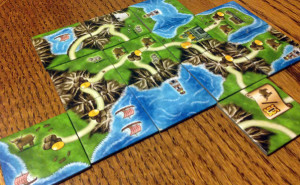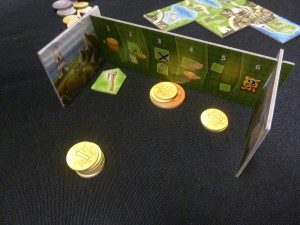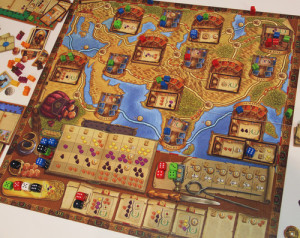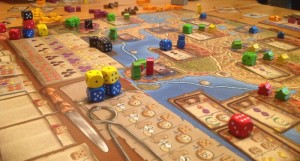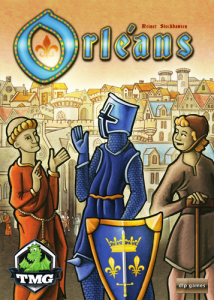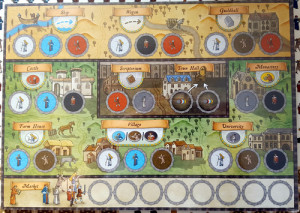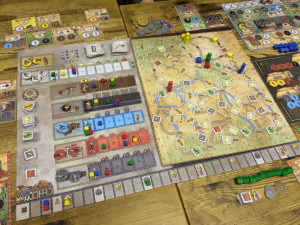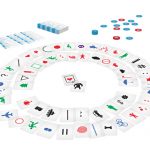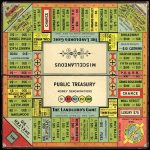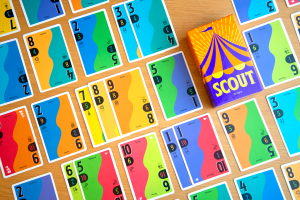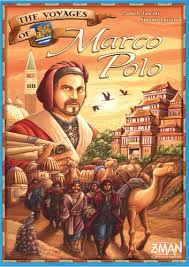
Medium weight Euro games, they often have a few things in common:
- They love to use old stuff as their themes, Egyptians, Romans and the 15th-18th centuries are special faves
- Having a middle aged dude staring out from the front of the box is a must.
- Sticking some camels, sheep or wheat in there as a commodity is an unwritten law
I guess if it ain’t broke, don’t fix it, but they are never going to capture the youth market with such selling points. Still they are pretty awesome things IMO. Low luck, interesting choices and clever mechanics all packed into around 90 mins. They are probably my favorite type of game and in the store we’ve had three crackers hit the shelves recently you may be interested to learn a little about. None of these games are crazily complicated and if you’ve played Catan, Takenoko, Ticket to Ride (lighter Euro games), you are already 2/3’s of the way there. If you want to know more watching Mr. Rahdo wax lyrical about these games on YouTube is a good way to learn the rules and strategic levels available. First up…
Isle of Skye
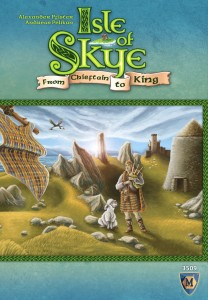
In a Nutshell: It’s Carcassonne with an auction and variable scoring.
Gameplay: There are 16 different ways to score in this game, however each game you will pick just 4 of them, which will be labelled A, B, C and D. Over the course of 5 or 6 rounds, they will each score 3 times. A and B in the first round, B and C in the second A, C and D in the third etc…
A game consists of the following:
Drawing three tiles from a bag and then pricing them in secret. The tiles can be seen by everyone, but behind a screen you will price two and axe a third which will be tossed from the game. When everyone is ready, you all reveal your pricing and starting with the first player you each get to buy one tile off of anyone except yourself. However, you set the price with your own money, which can’t be used to buy tiles. If someone buys the tile you get that money back and the money they bought it with. Any tiles that were not bought, have to be paid for buy you, so set them too high and you are buying them yourselves. You then all place your tiles Carcassonne like in front of you. Water must connect to water, grass to grass and mountains to mountains. Where you place them and what you buy will be driven by the scoring tiles of that game. You will receive some more money at the start of each round to spend again, but only so much money will leave the game so prices will go up fairly fast.
Why its awesome?
What price to set is crucial. Sometimes you want your own tile so you set it really high to put people off, but that leaves you poor to buy other peoples tiles. Add in the puzzly nature of the tile laying and the fact every game plays very differently depending on the scoring tiles and you have a really jam packed game in a 45-60 minute time span at a reasonable price point.
The Voyages of Marco Polo
In a Nutshell: Get a crazy power, roll some bones and stick ’em on the board to do stuff.
Gameplay: Over 5 rounds you will try to collect resources to fulfill contracts as well as voyage around the map to set up trading posts to expand your options and get more stuff. You do this by rolling 5 dice and then placing them on the board in different spots to do a variety of actions, such as move, get money, convert stuff into other stuff and obviously get camels. Sounds very dull, but its really not!
A game consists of the following:
At the start the game you will receive a character with a special power. In many games these are nice but fairly minor in the big scheme of things. In Marco Polo, they are game changing so that your game will be entirely different because of that power. One example would be the ability to not have to roll your dice, just set them to whatever the heck you want. In the game, the first player to get from Venice to Beijing gets a big point bonus. One charactr lets you start already in Beijing, with the full point bonus already with zero competition to get to the local towns and cities as everyone else is on the other side of the globe! It is very cool.
Each round you roll your 5 dice, low rolls get compensation. Then in turn order you start placing them on action spots to gain resources, get contracts and move. When you move you have to pay lots of money, because in those days you couldn’t take a Westjet flight. Where you stop you get to set up shop, this means getting a bonus at the start of every round or earning the ability to do new actions. In most cases you can take the same action that someone else took, but if someone else is already there you have to pay some money. The higher the number on the dice, usually means a better action, but you have to pay the number on the dice to do that action, bummer. During your turn you can pay camels to get another dice, re-roll them or just up them a pip in value. Once everyone has placed all their dice, the round is over and you take them all back. Re-fill contracts and roll again.
Why this game is awesome?
Unlike a lot of worker placement games, where if someone takes a spot its blocked; in this one, in most cases (but not all) you can still go there, you just have to pay to do so. That makes for some really tough decisions, because all the choices are there, but cash flow will limit your choices, not who goes where. Movement is really tough. Its costs a small fortune to get anywhere, so deciding where to go is tough and a lot of your points will be determined by that. Many locations on the board offer an action, but only 9 out of the 30 or so available are used each time, so lots of variability in the map set up. Finally those powers, so powerful, so game defining, but yet balanced and they make each play oh so different.
Orleans
In a nuthshell: draw guys from a bag, stick ’em on the board to get more guys, which you then throw in the bag. Lather, rinse, repeat…
Gameplay: 17 rounds. At the start of each round an event happens. You draw guys from your bag and then everyone simultaneously places them on their own board to do actions and/or gain workers. When everyone is ready, the start player does one action, putting their guys back in the bag, then the next player and so on until everyone has completed all their actions. Resolve the event and start the round again. You are trying to earn points by collecting resources (wheat is one of them), set up trading houses around Orleans and earn money, all of which translate into points.
A game consists of the following:
Each player has their own personal board with which they can do stuff. No competing here. You always get to do what you want(ish). An action usually requires 2 or 3 different guys to complete it. When you draw from the bag you may not necessarily get the ones you needed. That’s fine. You don’t have to use all your guys, they can be saved from round to round until you get what you need. There are two major types of action, the moving on the board actions and the getting more guys actions. At the start you need more guys. Depending on the strategy you decide upon, you will need more of certain guys than others. When you obtain a new follower you get to put him in your bag and also receive a bonus by moving up a track of that follower. The further up the track you go, often results in better bonuses. For example gaining a Knight means you can draw more guys from the bag. A monk can be used as a wild card in place of other guys and the craftsman enables you to automate a space on your board, so it is essentially always filled for the rest of the game. A merchant enables you to take a trader tile and add it to your board, expanding the number of actions available to you. The board actions move your pawn around the communal board which depicts a map around Orleans. Doing so enables you to collect goods and as another action place trading stations which are worth points at the end of the game. The last key choice is the ability to send your people to the beneficial deeds board. This is a way to clear unwanted follwers from your bag as they stay there, never to return.
What makes this game awesome?
As my wife would say, ‘you can’t mess with my stuff!’ It’s a pretty solo game. There is a little bit of a race to be the first to get something in there, but its a pretty minor part of the game. There are tonnes of choices and the bag draw forces you to make the best decision you can with what you get, which may not always be what you want. Everyone makes their major choices at the same time, which is great, so there is very little waiting around for others to take their turn. Finally the choice of strategies available is massive, you can go down a tonne of different routes in order to claim victory and the merchant tiles offer some nice extra options to give you extra options. Plus the bags are made of a very nice, bright velour!

